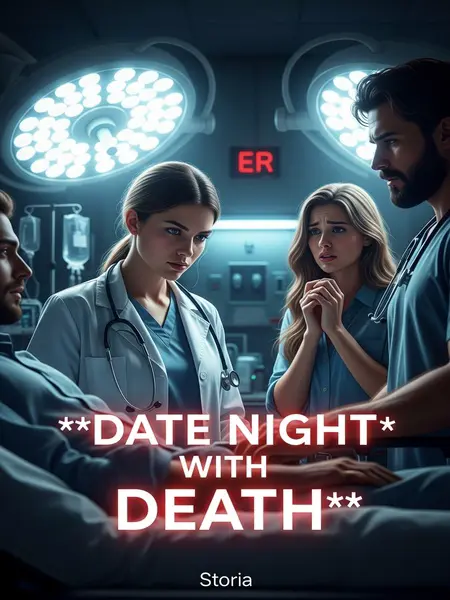Chapter 1: The Night Turns Dangerous
Several years ago, I had just started working solo shifts in the emergency department, the kind of nights when I tasted stale hospital coffee on my tongue, felt the cool weight of my badge-clipped trauma shears against my scrub pocket, and kept glancing at the empty attending chair that now, unnervingly, was mine.
It was the kind of late night where the hospital hum felt a little thinner, quieter but with that unpredictable edge: overhead code pages echoing, the squeak of Crocs on linoleum, the antiseptic bite of chlorhexidine mixing with the low vending-machine hum. At eleven o’clock, the automatic doors slid open, and in walked a young guy—looked about thirty. He introduced himself as Jake, and his girlfriend, Maya, hovered close. You could tell right away something was off. Even under the harsh ER lights, his skin was angry red, blotchy with raised hives and wheals, like he’d spent the day rolling in fiberglass insulation. He kept scratching his forearms, leaving pale streaks across the flushed skin, and his face was so bright it was almost neon, as if he'd pulled an all-nighter at a frat party instead of winding up here.
But the patient insisted, almost sheepish, that he'd only had two bottles of Bud Light that evening. He gave a shrug like, “Come on, doc, that's nothing.” Said he could easily knock back five or six and still be good to drive, though he knew better than to try. I didn’t condone that—one drink and a steering wheel is already a bad idea—and I redirected him back to the night’s details. I made a mental note—not exactly a lightweight, and definitely not enough booze to turn his skin that shade of fire-engine red.
His red face clearly wasn’t from drinking. I was certain. This was a by-the-book allergic reaction, a classic histamine flush with diffuse pruritus and urticarial plaques.
He explained how he’d gone out for barbecue—one of those laid-back grill bars with sticky tables and a jukebox in the corner, the kind of place that mixes cuisines and occasionally runs an Oaxacan special. Just as he was finishing up, he started feeling weird—itchy, uncomfortable, like he wanted to crawl out of his own skin. He figured it might be an allergy kicking in. Thankfully, his girlfriend was quick-thinking; she dashed out to the CVS right next door and grabbed some Benadryl (diphenhydramine). But as soon as he swallowed the pill, his stomach started to cramp up and he got hit with a wave of nausea. “My body freaked out,” he said. Not five minutes later, he puked—hard—losing all the barbecue and likely the medicine along with it, which meant the antihistamine never had a chance to absorb.
They were both pretty rattled, voices shaky as they told me the story, eyes darting around the busy ER. Maya’s knuckles whitened around the strap of her tote as Jake’s leg jiggled and he took a trembling breath. No one expects a dinner date to end up like this. They hustled over here within minutes of the first symptoms—maybe fifteen from onset to arrival—not bothering to finish paying the bill.
There was no need to overthink it—this was definitely an allergic reaction. My emphasis shifted toward severity more than certainty; very few things cause sudden full-body itching, hives, and redness like this, and my priority flipped from “what” to “how bad.”
In the back of my mind, I was running through possibilities, but honestly, the signs were textbook: the full-body itch, the blotchy wheals, that radiating heat off his skin. In moments like these, my rule-out list for the resident was simple: anaphylaxis until proven otherwise.
The question was, what triggered the allergy? Was it something in the spice blend—shrimp paste, fish sauce—or peanut oil in a marinade? Sesame seeds or a tree-nut garnish? Cross-contamination on the grill from shellfish?
The patient said he’d had allergic reactions before, but never this bad. This time, his whole body was affected. He admitted to a fleeting spell of lightheadedness and a dry tongue, even a momentary sense of throat tightness—hard to describe, but enough to bring him to the hospital.
He tried to laugh it off, said he was no stranger to rashes or stomach issues, but admitted this was next-level. I could tell he was worried; guys his age don’t usually end up in the ER for a little itching unless something feels seriously wrong. Young men often minimize symptoms, and I kept a quiet resolve not to let bravado lull me.
I asked if he had any other previous illnesses. He said no, and I ticked through a quick U.S.-style review: any blood-pressure meds like beta-blockers or ACE inhibitors, any prior EpiPen use, family history of allergies, current meds or supplements, vaping or smoking.
He shrugged, “No diabetes, no asthma. I’m healthy otherwise.” He seemed almost embarrassed, as if admitting to being sick was a personal failing. No prescription meds, no EpiPen, no regular supplements; he didn’t smoke and only vaped once at parties.
I asked if he knew what he was allergic to. He tried hard to remember but couldn’t say for sure. Sometimes, after eating certain foods, he’d get diarrhea or a rash. I pressed on prep details—peanut oil, fish sauce, shrimp paste in marinades, sesame, tree-nut garnishes, and whether the grill shared space with shellfish.
He squinted, running through a mental checklist—seafood, nuts, dairy—but nothing stood out. He mentioned sometimes getting an upset stomach after spicy food, or a weird rash after shellfish, but never like this. Maya chimed in, worry pinching her brow, and added the grill might have had shrimp on earlier skewers.
His girlfriend was just as confused. She said everything they’d eaten at the restaurant, they’d had before: skewers, mushrooms, chives, beer—they’d had all those countless times. Even grilled grasshoppers weren’t new; this place was one of those hybrid barbecue bars with a trendy Oaxacan touch.
She rattled off the menu like she was reciting a shopping list. “We had the usual—beef skewers, mushrooms, chives, a couple beers. Oh, and grasshoppers.” She said it so casually I almost did a double-take; chapulines are adventurous, but not unheard of.
“Grilled grasshoppers? What are those? I’ve never heard of anyone eating those.” I kept my tone professionally curious. “Some folks do react to insects, especially if they’ve got shellfish sensitivities.”
I leaned in, genuinely curious. “You mean actual grasshoppers? Like, the bugs?” I softened my voice, aiming for warm and matter-of-fact rather than skeptical.
“They’re just grasshoppers—grilled grasshoppers.”
She nodded, not missing a beat. Apparently, it was a thing at this place—local, crunchy, a bold special for diners with a curious palate.
I was genuinely surprised. “Wow, you two are game.”
I gave a little chuckle, trying to lighten the mood. “That’s definitely not on my bucket list. You’re braver than I am.”
The patient gave a bitter smile. “Protein is protein. I tried it once before and was fine. This time, I brought my girlfriend to try something new. She didn’t dare, but I had a few.”
He grinned weakly, rubbing his arm. “Honestly, I think it’s more hype than flavor. But hey, someone’s got to try it, right?” He looked at his girlfriend, teasing, and she rolled her eyes, smiling despite herself.
“Maybe you’re allergic to grilled grasshoppers,” I suggested.
They didn’t buy it. “Isn’t it only the first time you eat something or take a medicine that you can have an allergic reaction? This isn’t his first time eating grilled grasshoppers—it’s his second.” I added, briefly, that allergic reactions usually require prior sensitization; second exposures are common triggers.
They both leaned in, almost challenging. “Can you even be allergic on the second try? Doesn’t it usually happen the first time?” There was a bit of tension—no one likes uncertainty in the ER. I gave them a quick teaching pearl: insects and shellfish share cross-reactive proteins like tropomyosin and arginine kinase, which can trick the immune system if you’re sensitive.
I didn’t bother explaining further and asked the resident doctor to quickly take the patient to the trauma room. “We’ll explain as we go; first we need you somewhere we can monitor you closely.”
I gave a quick nod to the resident, signaling urgency. “Let’s move—the trauma room,” I said, as his radio crackled and an overhead rapid response was called two floors up.
The patient got nervous when he heard about the trauma room. “It’s just an allergy—why do I need to go there?” I clarified, “It’s our resuscitation bay—the place with the best monitors and equipment.”
He looked alarmed, gripping the arms of his chair. “Is this really that bad? I mean, it’s just a rash, right?” I kept my voice steady and said, “We’re being careful because rashes can be the start of something more. Staying close is safer.”
The resident doctor was also unsure. “The trauma room is already full. There aren’t any beds.” We were boarding admitted patients, hallway beds were jammed, and ambulances were offloading nonstop.
He hesitated, glancing at me for confirmation, unsure if we were overreacting or not. The ER was packed—an unattended paramedic gurney parked by the door—but I was firm.
I said, “Then get a wheelchair. Let him sit in it and wheel him into the trauma room.”
I tried to keep my voice calm but direct. “Just grab any chair that rolls. We need him close to the bay,” I added, as a nurse maneuvered past with an IV pole.
No matter what, the patient needed to stay in the trauma room—nowhere else. Hypotension with GI symptoms plus skin findings meant anaphylaxis until proven otherwise.
I didn’t want to take chances. The trauma room—our resuscitation area—was where we kept a close eye, with the crash cart nearby just in case. I glanced at the defib pads and airway roll on top, and the resident caught my drift and hustled out to position Jake just outside the bay where we could access a monitor.
The resident doctor knew I was careful about these things. As soon as I finished speaking, his shoes squeaked on the linoleum as he peeled off toward the wheelchair alcove.
He knew I was the kind of attending who didn’t mess around when it came to allergic reactions. One look from me, and he was out the door, moving fast, his clipped radio chirping as he grabbed a chair.













